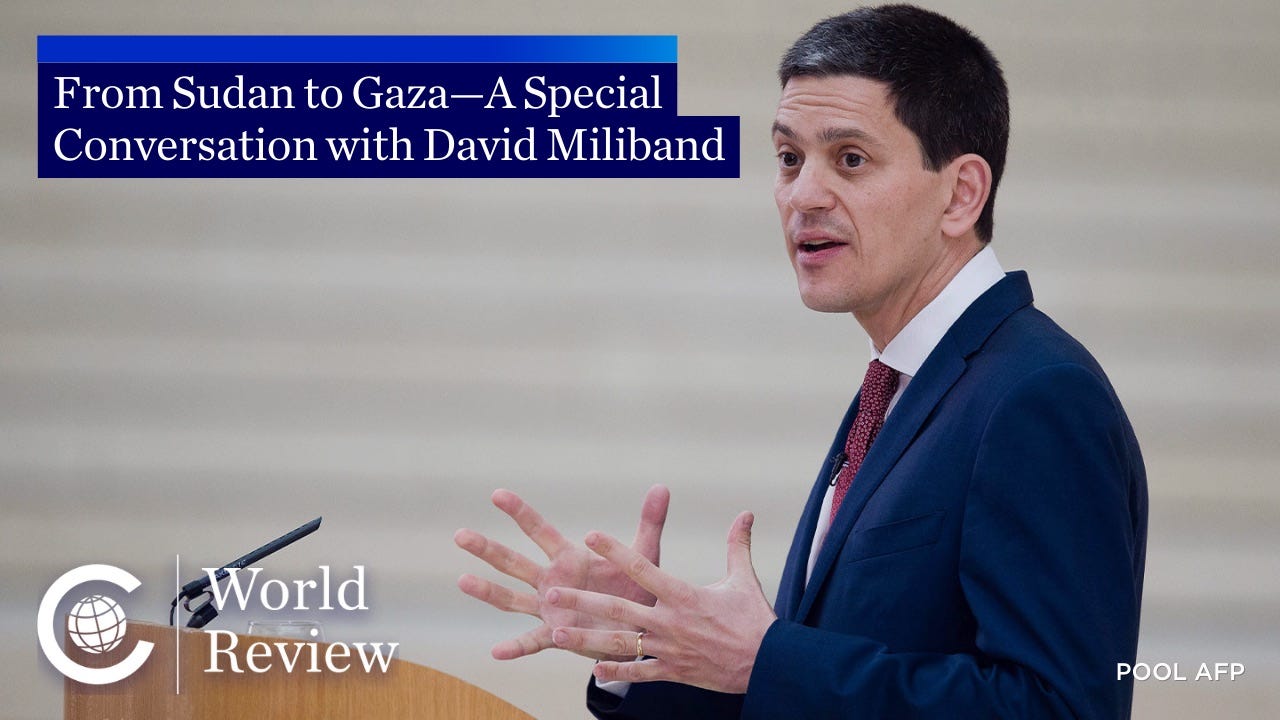World Review: From Sudan to Gaza—A Special Conversation with David Miliband
A brief synopsis of this week's show
This week’s World Review with Ivo Daalder was a little different than my regular podcast. Instead of three journalists, I had the honor to welcome David Miliband, President and CEO of the International Rescue Committee and former UK Foreign Secretary, to a conversation about the humanitarian crises in the world and what to do about them where three journalists from major news outlets around the world join me in discussing the latest global news stories of the week.
“World Review is always fascinating. I love the fact that you can get journalists from around the world to participate since zoom is the medium.”
— A Subscriber to America Abroad
While I encourage you to watch or listen to the episode (and subscribe wherever you get your podcasts!), here are a couple of interesting things I took away from our discussion :
The level and number of humanitarian crises around the world is escalating greatly—but some of the biggest crises do not get the attention they deserve. Each year, the IRC publishes an Emergency Watchlist containing the 20 top crises areas around the world, including listing the first 10 by level of severity. These 20 crises contain 86 percent of the world’s people in need—about 300 million in total—including refugees, internally displaced people, food insecure populations, and other people who depend on the humanitarian aid system to survive. Gaza (and the West Bank) is high on the list (at number 2).
But topping the list is the crisis in Sudan, which David described “as an avatar for what is going wrong in the world.” A few years ago, the people overthrew a dictator and a civilian government took its place. But last April, a civil war broke out, with both sides supported by outside actors. The result is large-scale displacement of the population, 25 million people in acute need of assistance, and 7 million facing famine. Millions have fled, further destabilizing other countries, including South Sudan, while in the Dafur region, we now see a return of genocidal forces that beset the region earlier this century.
The situation inside Gaza has received much more global attention—in part because it is the fastest growing and most intense humanitarian crisis in the world today. What makes it difficult for many is the fact that it started because of a heinous attack on Israelis and Jews but has culminated in a war that has left tens of thousands killed, hundreds of thousands destitute, and millions displaced. It’s a man-made disaster, which could be eased by a ceasefire and the rapid delivery of more aid. The problem isn’t tactical or logistical; it is political. “The only way to fulfill the legal and moral imperative,” David explained, “is for the fighting to stop, is for a ceasefire.”
All of these humanitarian crises demonstrate the centrality of what David has called the growing global crisis of impunity. With the Chicago Council and the Eurasia Group, David has led an international effort to measure the extent of impunity—the absence of accountability—across five different dimensions around the world. A few weeks ago, we released the second annual Atlas of Impunity, ranking nations across the globe by the level of impunity in terms of governance, human rights, conflict, economic exploitation, and environmental degradation. The top and low ranks of impunity are filled with countries one would expect — Afghanistan ranks highest, Finland and other Nordic countries lowest on their respective level of impunity. But fate is no decider—the median rankings include large and small countries, rich and poor, autocratic and more liberal ones. The United States ranks closer to the median than to the low end.
That’s it for my quick takes of this week’s episode here on America Abroad. To get the full flavor, please listen to the episode itself.



